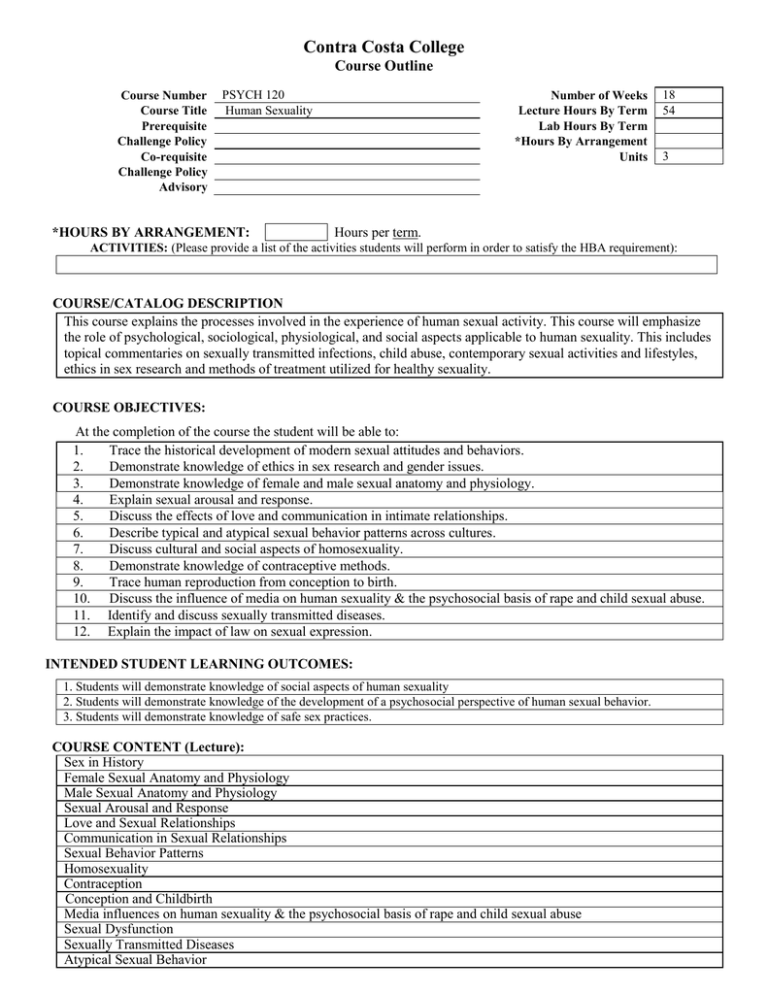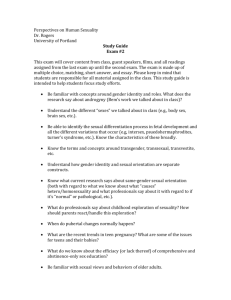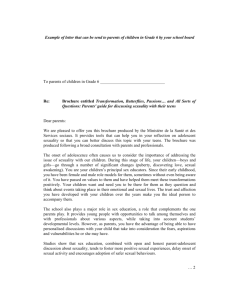
Contra Costa College
Course Outline
Course Number
Course Title
Prerequisite
Challenge Policy
Co-requisite
Challenge Policy
Advisory
PSYCH 120
Human Sexuality
*HOURS BY ARRANGEMENT:
Number of Weeks
Lecture Hours By Term
Lab Hours By Term
*Hours By Arrangement
Units
18
54
3
Hours per term.
ACTIVITIES: (Please provide a list of the activities students will perform in order to satisfy the HBA requirement):
COURSE/CATALOG DESCRIPTION
This course explains the processes involved in the experience of human sexual activity. This course will emphasize
the role of psychological, sociological, physiological, and social aspects applicable to human sexuality. This includes
topical commentaries on sexually transmitted infections, child abuse, contemporary sexual activities and lifestyles,
ethics in sex research and methods of treatment utilized for healthy sexuality.
COURSE OBJECTIVES:
At the completion of the course the student will be able to:
1.
Trace the historical development of modern sexual attitudes and behaviors.
2.
Demonstrate knowledge of ethics in sex research and gender issues.
3.
Demonstrate knowledge of female and male sexual anatomy and physiology.
4.
Explain sexual arousal and response.
5.
Discuss the effects of love and communication in intimate relationships.
6.
Describe typical and atypical sexual behavior patterns across cultures.
7.
Discuss cultural and social aspects of homosexuality.
8.
Demonstrate knowledge of contraceptive methods.
9.
Trace human reproduction from conception to birth.
10. Discuss the influence of media on human sexuality & the psychosocial basis of rape and child sexual abuse.
11. Identify and discuss sexually transmitted diseases.
12. Explain the impact of law on sexual expression.
INTENDED STUDENT LEARNING OUTCOMES:
1. Students will demonstrate knowledge of social aspects of human sexuality
2. Students will demonstrate knowledge of the development of a psychosocial perspective of human sexual behavior.
3. Students will demonstrate knowledge of safe sex practices.
COURSE CONTENT (Lecture):
Sex in History
Female Sexual Anatomy and Physiology
Male Sexual Anatomy and Physiology
Sexual Arousal and Response
Love and Sexual Relationships
Communication in Sexual Relationships
Sexual Behavior Patterns
Homosexuality
Contraception
Conception and Childbirth
Media influences on human sexuality & the psychosocial basis of rape and child sexual abuse
Sexual Dysfunction
Sexually Transmitted Diseases
Atypical Sexual Behavior
Sex and the Law and Ethics in sex research & Prostitution
Cross-Cultural Variations in Sexual Expression
METHODS OF INSTRUCTION:
Power point Lecture
Multimedia
Group Discussion (small group)
Online course elements including but not limited to course management software
COURSE CONTENT (Lab):
N/A
INSTRUCTIONAL MATERIALS:
NOTE: To be UC/CSU transferable, the text must be dated within the last 7 years OR a statement of justification for a text beyond the
last 7 years must be included.
Textbook Title:
Author:
Publisher:
Edition/Date:
Textbook Reading Level:
Justification Statement:
Sexuality Now: Embracing Diversity
Carroll
Cengage
4th edition/2014
College level
(For textbook beyond 7 years)
Lab Manual Title (if applicable):
Author:
Publisher:
Edition/Date:
OUTSIDE OF CLASS WEEKLY ASSIGNMENTS:
Title 5, section 55002.5 establishes that a range of 48-54 hours of lecture, study, or lab work is required for one unit of credit.
For each hour of lecture, students should be required to spend an additional two hours of study outside of class to earn one
unit of credit.
Title 5, section 55002(a) 2F establishes coursework should call “for critical thinking and the understanding and application of
concepts determined by the curriculum committee to be at college level.”
For degree applicable courses: List one example of critical thinking out-of-class assignments
Outside of Class Weekly Assignments
Hours per week
Weekly Reading Assignments (Include detailed assignment below, if applicable)
3
A selected chapter (s) will be assigned for students to read for conceptual based knowledge. Class discussion of
pertinent concepts will follow.
Weekly Writing Assignments (Include detailed assignment below, if applicable)
2
Article reviews are intended to enhance your learning of Human Sexuality outside of the classroom. These
reviews are summaries of articles, which are located via the Infotrac (Expanded Academic) research database
located in the CCC library, pertaining to the subject of Human Sexuality. These reviews are to include: a
summary of the issue at hand, the pro’s and con’s of the issue discussed and your opinion of the issue. Each of
these reviews is worth 30 points a piece. All reviews should be at least 2-3 pages typed and doubled spaced.
The article from which the summary was derived should be attached/copied and turned in along with the
review. Refer to the Expanded Academic keyword handout given to you by your instructor for further
instructions.
Weekly Math Problems (Include detailed assignment below, if applicable)
Lab or Software Application Assignments (Include detailed assignment below, if applicable)
Other Performance Assignments (Include detailed assignment below, if applicable)
1
Students will be assigned a reading and a series of questions will follow: Such as read chapter 5 on Men’s Sexual
Anatomy & Physiology; Answer the following questions on a typed word document and submit this to the dropbox:
(e.g. What are kegel exercises? Why may they be helpful for some men? What is cryptorchidism? What are the long
term effects of cryptorchidism? Etc.)
STUDENT EVALUATION: (Show percentage breakdown for evaluation instruments)
Title 5, section 55002 (a) 2A requires that the grade be based on demonstrated proficiency in subject matter.
For degree applicable courses: Course requires essay writing, or, in courses where the curriculum committee deems
appropriate, problem solving exercises, or skills demonstrations by students.
Title 5, section 55002(a) 2F requires that coursework call for critical thinking and the understanding and application of concepts
determined by the curriculum committee to be at college level.
For degree applicable courses: List (an) example(s) of methods of evaluation that assess critical thinking.
24
66
10
%
Essay
Reaction Papers
Computation or Non-computational Problem Solving Skills
%
Skills Demonstration
%
Objective Examinations
%
%
%
%
Quizzes and Exams (Midterm and Final)
Other (describe)
Out of class assignments tied to reading assignments
GRADING POLICY: (Choose LG, P/NP, or SC)
Letter Grade
90% - 100% = A
80% - 89% = B
70% - 79% = C
60% - 69% = D
Below 60% = F
Pass / No Pass
70% and above = Pass
Below 70% = No Pass
Prepared by: Michel B. Arnold, MS
Date: 9/7/14
Revised form 08/14
X
Student Choice
90% - 100% = A
80% - 89% = B
70% - 79% = C
60% - 69% = D
Below 60% = F
or
70% and above = Pass
Below 70% = No Pass







